Ethnic weddings are a wonderful way to celebrate two people in love, coming from different cultures and backgrounds. It’s a beautiful opportunity to learn more about different traditions and customs, all while celebrating the joy of marriage.
One of the most timeless and widely celebrated ethnic wedding traditions is that of Muslim marriages. Every year, millions of Muslims around the world celebrate their love with an elaborate wedding.
Muslims have a variety of wedding customs and etiquette depending on which country they live in or what sect they belong to; however, when it comes to clothing, there are some universal guidelines to follow when attending a Muslim wedding.
In this blog post, we’ll discuss some do’s and don’ts regarding what to wear to a Muslim wedding. We’ll cover topics such as appropriate cultural considerations and dress code; so that you can be your best stylish self without being offensive.
Understanding Muslim wedding traditions and customs
Before we delve into wardrobe choices for a Muslim wedding, let’s briefly touch on the customs and traditions of these celebrations. Also known as nikah, Muslim weddings involve several ceremonies and rituals.
Depending on the culture, the process can take anywhere from a few hours to several days. In some instances, the bride and groom will have separate celebrations before they come together at the wedding ceremony.
Regardless of where or how it is celebrated, however, all Muslim weddings start with an Islamic contract known as a “nikah” which officially binds the couple
On the first day, the bride and groom will exchange their marriage vows in a private ceremony called the nikah. This is followed by a reception, where the newlyweds are introduced to their guests and the bride and groom are celebrated with music, dancing, and food.
The second day is typically reserved for the bride and groom to spend time with their families and close friends. This is often followed by a large wedding feast, called the walima, which is open to all guests.
On the third day, the bride and groom may choose to have a religious ceremony, called the dukhlah, which is an optional part of the wedding.
Overall, Muslim weddings are joyous and festive occasions that are steeped in tradition and cultural customs. As a guest, it is important to respect and appreciate these customs, and to dress modestly and appropriately for the occasion.
What to wear to a Muslim wedding as a guest – the basics
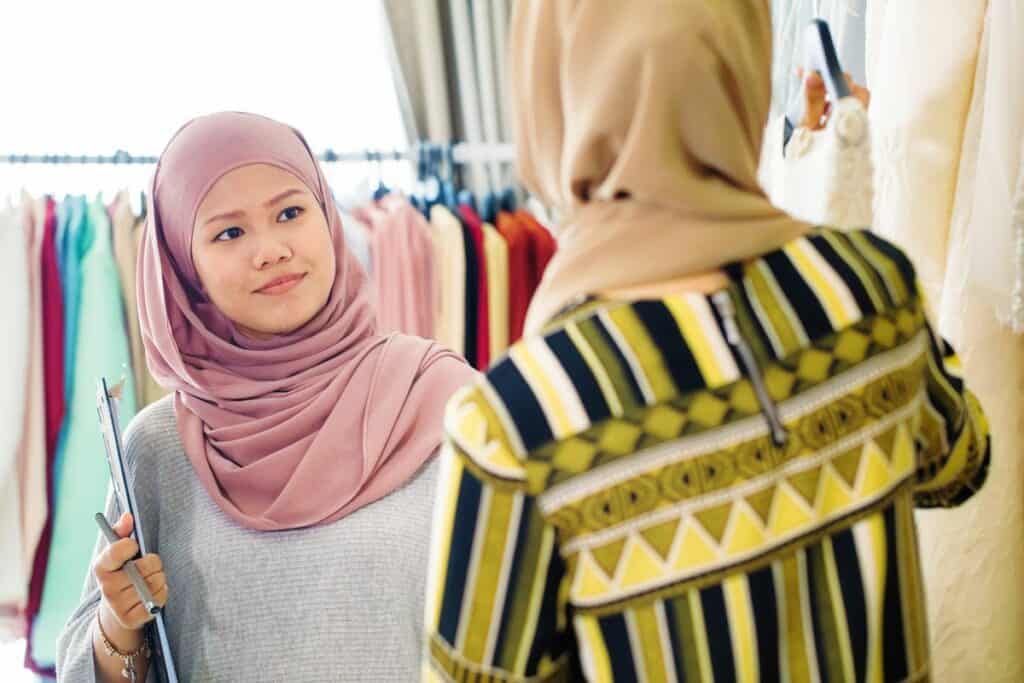
Here are some guidelines to follow when attending a Muslim wedding:
Dress modestly and respectfully
A central teaching in Islam is haya (modesty), which encompasses the way Muslims dress. In a nutshell, Muslim men and women are expected to wear clothes that cover their bodies modestly and avoid clothing that would be considered Immodest or alluring.
So, as a guest at a Muslim wedding, you should dress modestly in clothes that aren’t skin-tight, too short or revealing.
For women, this may mean choosing a dress or skirt that falls below the knee and covers your arms and chest. steer clear of low-cut tops or dresses altogether; loose-fitting clothing is much more appropriate.
Modest clothing for men usually entails wearing pants and a long-sleeved shirt, as well as avoiding shorts or short-sleeved shirts. Also, make sure to not wear anything that is too tight or shows too much skin – go for something baggy if you have to. You’ll be more comfortable this way and it will send the right message.
Traditional wedding attire for Muslim men and women
While there is no strict rule for what to wear to a Muslim wedding as a guest, there are some traditional wedding attire options often worn by Muslim men and women that you can try out.
For women, traditional wedding attire often includes a long dress or gown, commonly called a kaftan or abaya. These dresses are usually made from high-quality fabrics such as silk or satin and feature detailed embroidery and beading.
Along with the dress, women might also wear a headscarf like a hijab, and a pair of comfortable shoes.
For men, typical wedding attire typically consists of a long tunic called a Jubba. Jubbas are often made from luxurious fabrics such as silk and can be decorated with embroidery or beads. In addition to the Jubba, other common items include head coverings like taqiyahs or kufis, along with comfortable shoes.
Head coverings and accessories for Muslim weddings
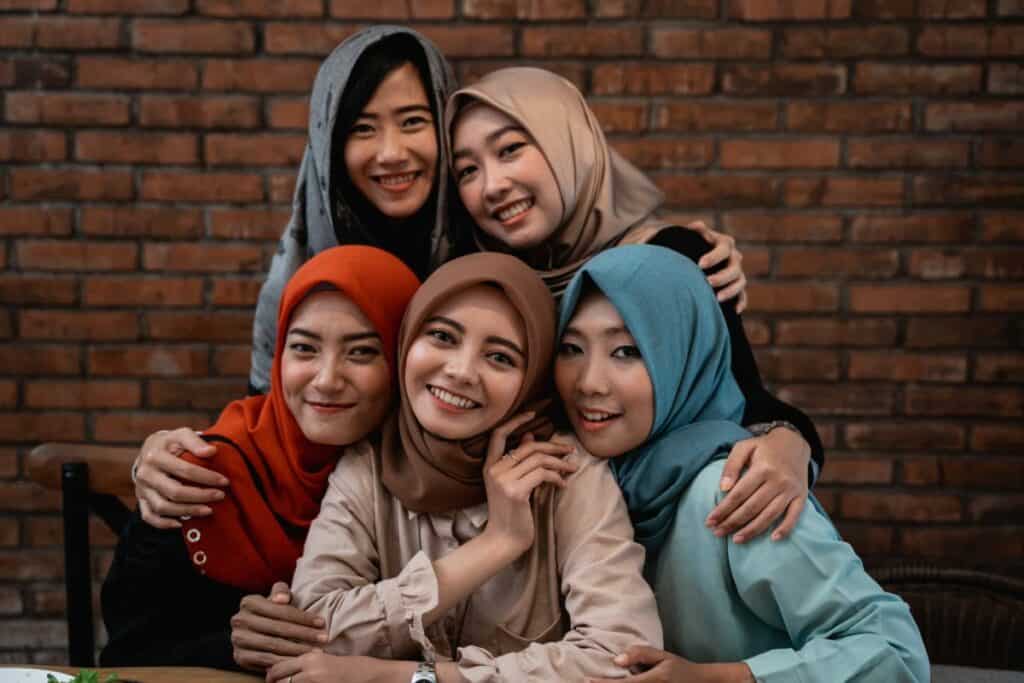
In addition to more modest and traditional clothing, it is also common among guests of Muslim weddings, men and women, to wear head coverings and other accessories.
For Muslim women, they may choose to wear a hijab which is a headscarf that covers their head and neck. Some women also elect to wear a niqab which only allows them to see through slits in the fabric, or a burqa which covers their entire body.
For men, traditional head coverings may include a taqiyah–a small, rounded cap worn on the head–or a kufi, which is larger and brimless. Some men also elect to wear a turban, comprised of a long piece of cloth wrapped around the head.
In addition to head coverings, both Muslim men and women may elect to wear simple and elegant accessories such as rings, bracelets or earrings. These kinds of accessories are typically worn to complement the modest and traditional clothing often associated with weddings.
When it comes to accessories, less is often more at a Muslim wedding. Avoid over-the-top jewelry or flashy, attention-grabbing pieces, and opt for more modest and understated accessories instead.
If you’re wearing a hijab, you can accessorize with a simple headband or a scarf that matches your outfit. Avoid wearing heavy or oversized earrings, and opt for smaller, more delicate pieces instead.
What colors can I wear to a Muslim wedding?
At a Muslim wedding, choosing an outfit in a celebratory color like gold or green is perfectly acceptable. These colors are often linked with happiness and can help make the wedding feel more festive.
Other suitable colors for a Muslim Wedding include purple, blue and pink. Men will frequently wear white or pastel-colored robes while women might prefer colorful dresses or skirts.
When in doubt, it is always a good idea to check with the couple or wedding planner to see if there are specific color requirements or preferences for the wedding.
What colors should I avoid?
It is important to be aware of any cultural sensitivities when choosing your outfit for the wedding. Dark colors such as black and navy blue should be avoided, as they are typically associated with funerals and may be seen as inappropriate for a joyous occasion.
In certain Arabic cultures and among Muslims living in the west, white is often only worn by brides. Therefore, it would be considered inappropriate for guests to wear this color.
Red is an interesting case and its appropriateness is sometimes disputed. In some cultures, such as Indian and Pakistani, it might be best avoided as the color red is often reserved for the bride’s dress. If the bride typically wears white in her culture, then wearing red wouldn’t pose any issue.
Tips for choosing the right outfit for a Muslim wedding
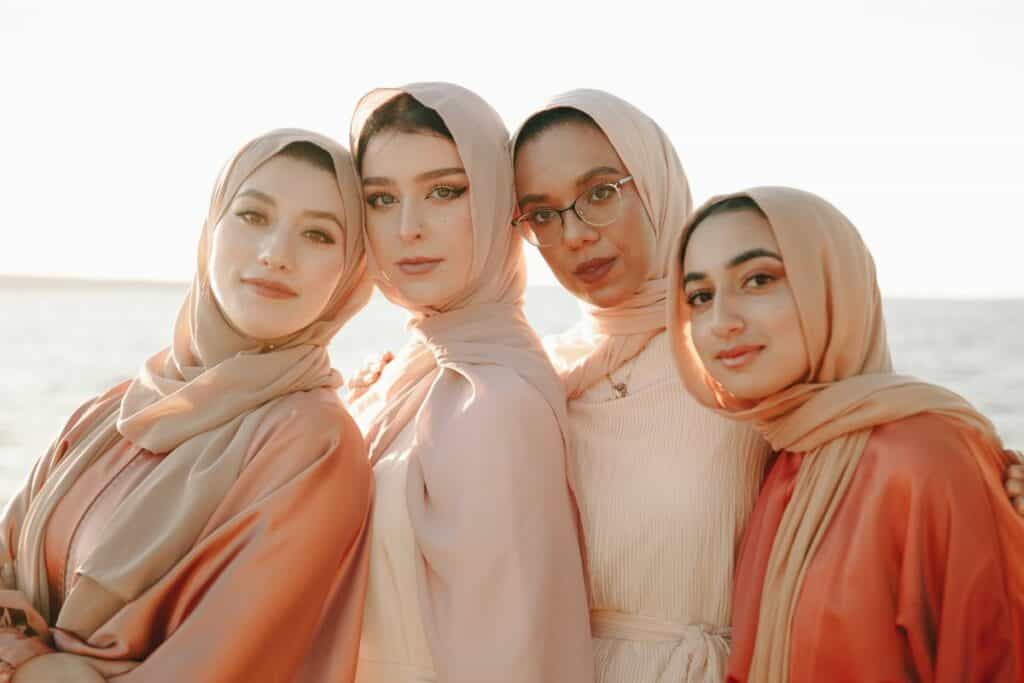
Want to look your best and still be appropriate for the occasion and respectful to those attending? Here are a few recommendations for modest yet stylish clothing options for Muslim weddings:
- Every Muslim couple is unique, and the clothing they pick for their wedding may differ based on where they come from ethnically and what styles they prefer. To make sure you are appropriately dressed for the event, it would be beneficial to learn about the bride and groom’s cultural traditions and customs.
- Be comfortable and modest by picking clothing that is not tight or overly constricting.
- Take the venue and weather into account. If the ceremony is taking place outdoors, opt for something comfortable that will work with the climate.
- You might want to try layering with a jacket or shawl. Not only will this keep you warmer, but it can also help cover your arms and chest for added modesty.
- Choose comfortable shoes. You will most likely be on your feet for a good chunk of the ceremony and reception, so it is essential that you have footwear that won’t end up giving you blisters or otherwise causing pain.
- In hot weather, steer clear of clothing made from synthetic materials, like polyester. They don’t breathe well and can be uncomfortably clingy. Choose natural fabrics such as cotton, silk or linen instead – they’re much more breathable.
- Avoid a fashion emergency on the wedding day by trying on your outfit beforehand! Not only will this ensure that your clothing is comfortable, but you’ll also be able to confirm that you feel confident and stylish.
Common questions about dressing for a Muslim wedding
Here are some common questions about dressing for a Muslim wedding, and their answers:
Can non-Muslims wear traditional Muslim wedding attire?
Yes. Any person, Muslim or non-Muslim, is welcome to wear traditional Muslim wedding clothes if they please.
However, it’s important to stay aware of cultural and religious traditions so you can show respect by dressing modestly (nothing too flashy or tight) and avoiding colors usually reserved for the bride—white being a primary example.
If you’re unsure about what’s proper etiquette, always ask the couple getting married for guidance ahead of time.
What colors are typically reserved for the bride?
Many Muslim weddings involve the bride wearing a traditional, colorful, and intricate outfit. Depending on the couple’s ethnic and cultural background, the specific colors and design of the bride’s outfit can vary.
The color of the bride’s outfit can be any hue, as there is no one specific color that is traditional for Muslim weddings. However, many Middle Eastern brides choose to wear white to represent purity and modesty. For Indian and Pakistani Muslim couples, red is also a popular choice as it signifies love and joy.
Ultimately, the final decision on what colors to incorporate in the wedding blend rests with the married couple themselves.
Do I HAVE to cover my head at a Muslim wedding?
Covering the head is a common practice in many Muslim cultures, but it is not required for everyone. It is typically expected that women will cover their heads, but it is ultimately up to the individual to decide whether or not to do so.
If you are unsure, it is always better to err on the side of caution and ask the couple getting married or a member of the wedding party for guidance.
Can men wear shorts to a Muslim wedding?
Wearing shorts to a Muslim wedding is generally not appropriate. Muslim weddings are formal occasions, and shorts are considered casual attire. Long pants or a suit would be more suitable for this event.
Final Thoughts
Attending a Muslim wedding is a great chance to dive into another culture and celebrate the bond of the newlywed couple. By respecting these guidelines and dressing conservatively, you can demonstrate appreciation for the customs and traditions of Islam, as well as enjoy this milestone event.
- Say ‘I Do’ with a Woof: 10 Adorable Golden Retriever Wedding Cake Topper Ideas! - December 10, 2024
- Bridal Set Vs Engagement Ring: An In-depth Guide to Help You Decide - October 14, 2023
- Unveiling the Heart of Filipino Weddings: Fascinating Traditions and Rituals - September 25, 2023

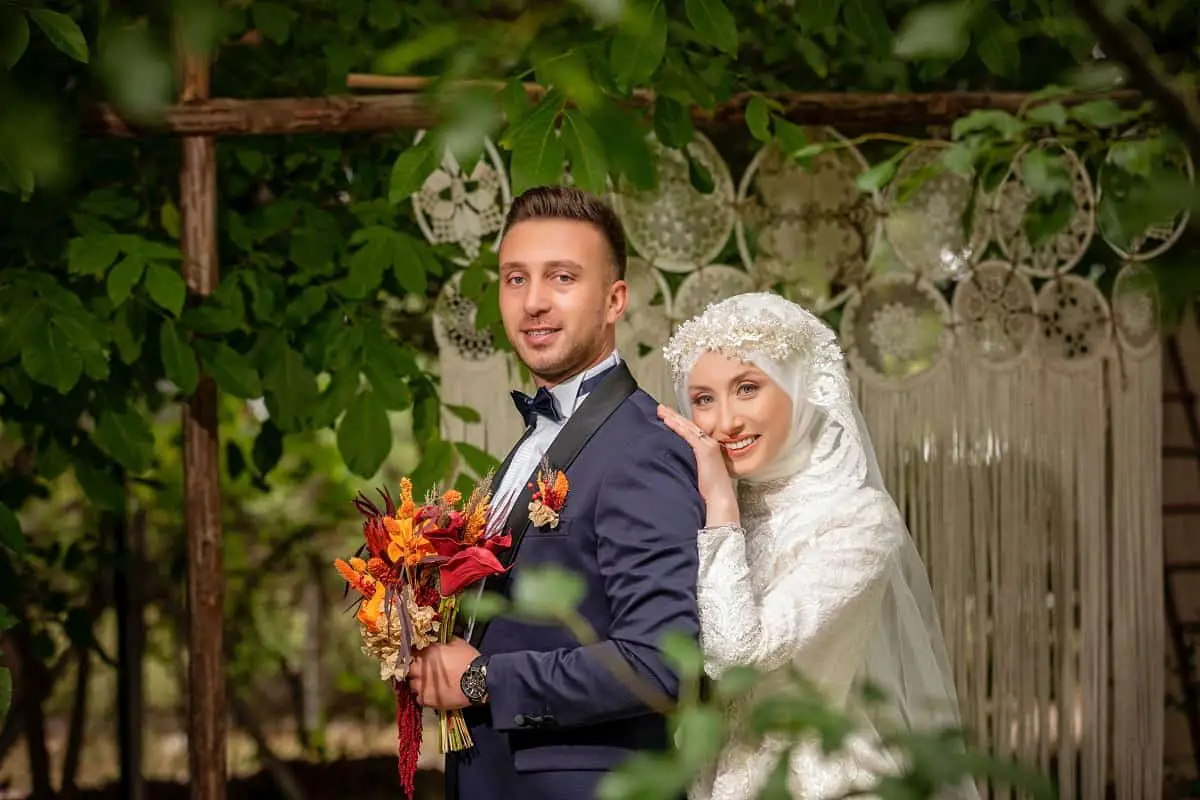
![How Much Is A Cartier Engagement Ring? 49 How Much Is A Cartier Engagement Ring? [On Average]](https://magicaldayweddings.com/wp-content/uploads/2022/12/How-Much-Is-A-Cartier-Engagement-Ring-On-Average-600x600.jpg)
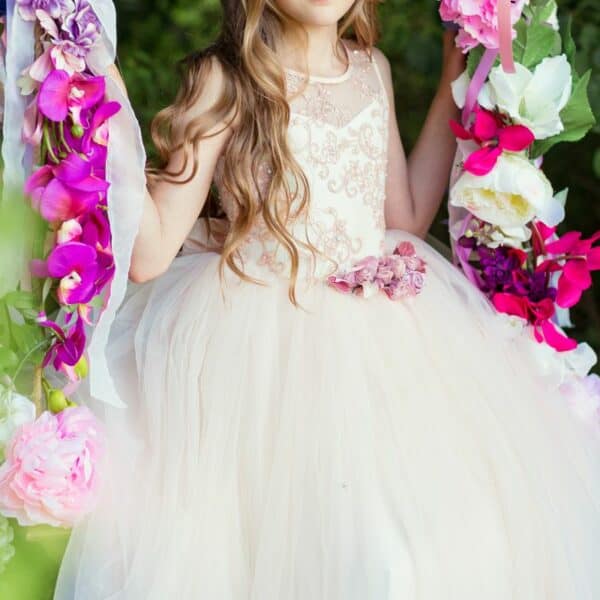
Leave a Comment